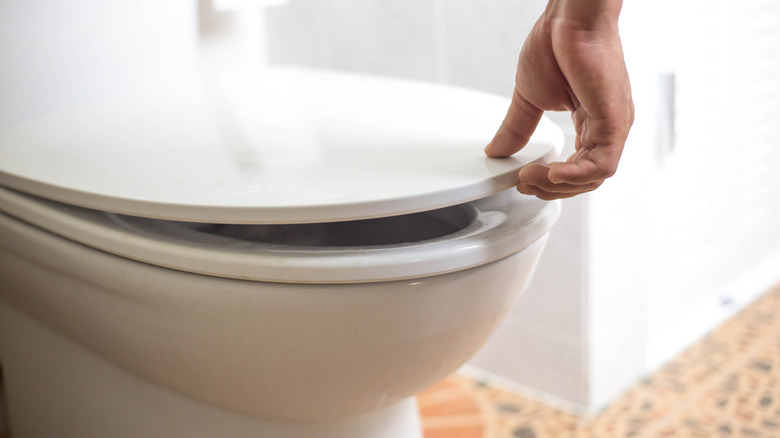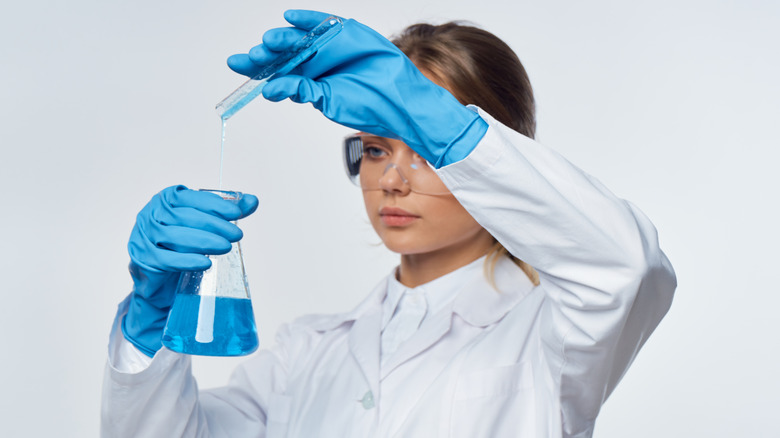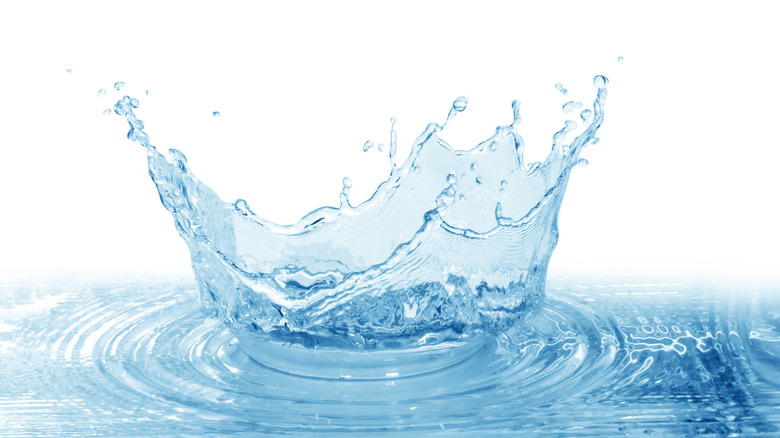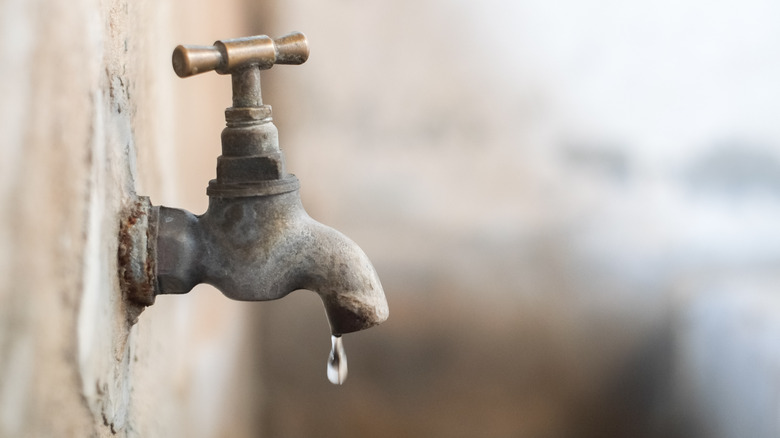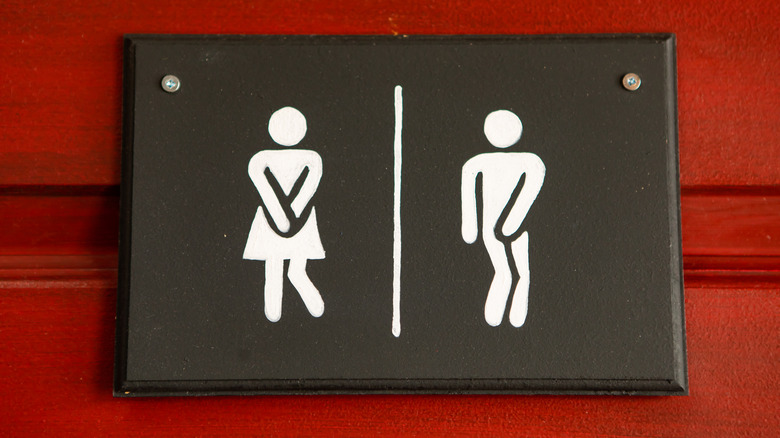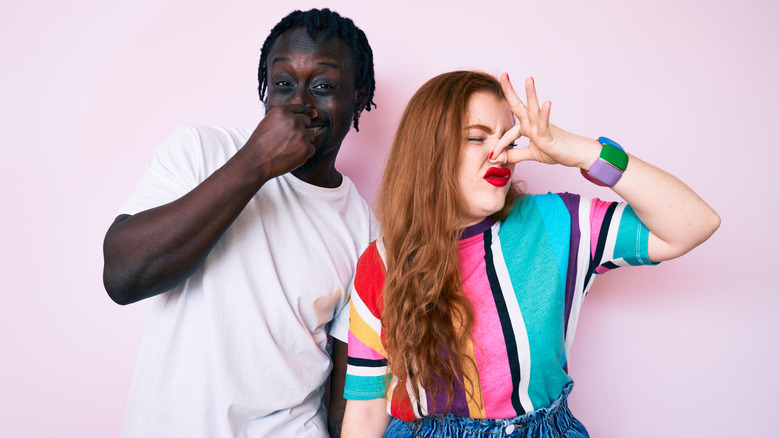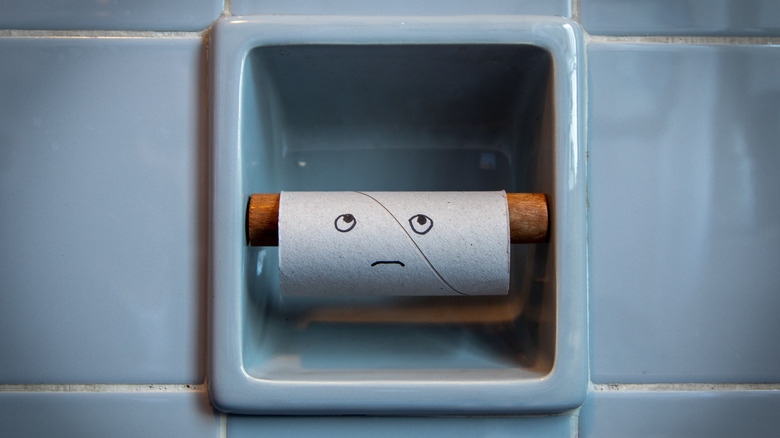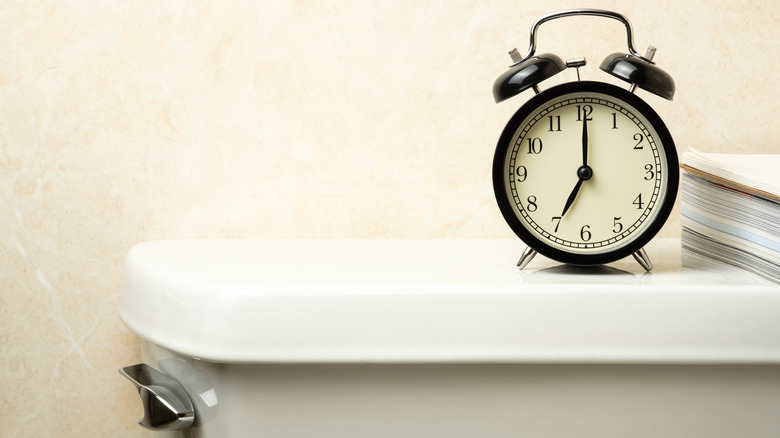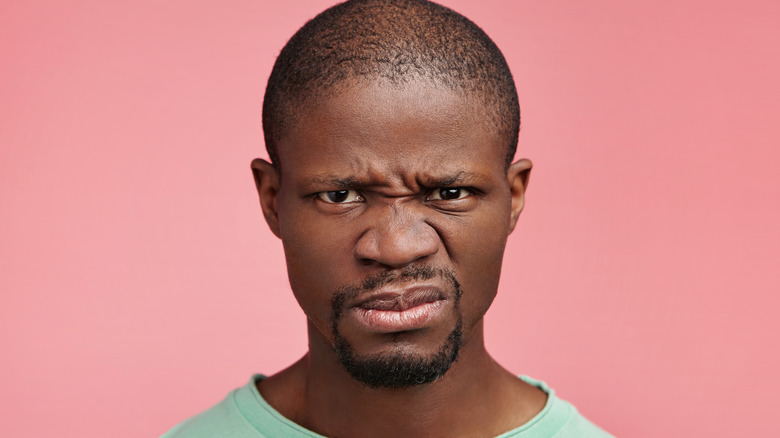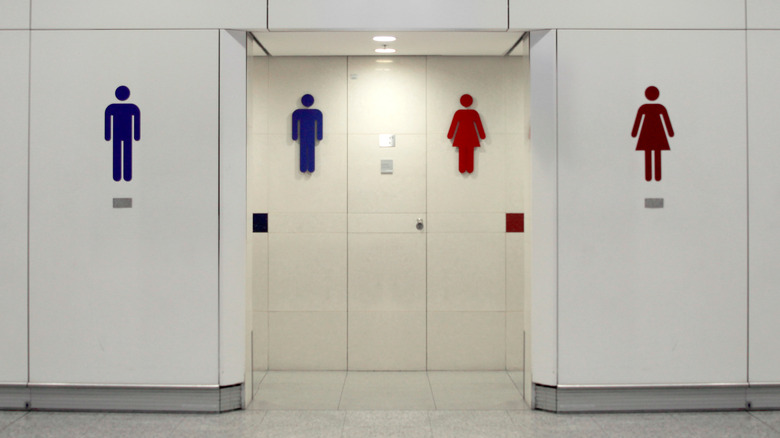Surprising Things Your Pee Can Reveal About Your Health
"How's your pee today?" is a question that will probably never replace "How's it going?" as a friendly greeting. But maybe it should. Okay, no, yuck, it absolutely should not. Can you imagine? But it is true that the status of your urine can say a lot about how you're doing, health-wise. Yes, your pee is a treasure trove of information about what's going on inside your body, not only signaling how hydrated you are and what you've been eating, but warning of infection, metabolic problems, organ functioning, and certain rare diseases.
In fact, we may be entering a golden age of urine testing, with scientists finding ways to identify everything from prostate cancer to Alzheimer's disease to the quality of your diet by testing urine samples. So if you don't take at least a glance ... and, sorry, a sniff ... before you flush, and you could miss out on some important internal intel. Keep reading to find out which of these toilet bowl tells are innocuous, and which of them mean urine trouble.
Is your urine red or pink?
A pinkish or downright red hue in your toilet bowl may be due to hematuria, or blood in the urine. A number of factors can cause this, some of which are serious. Possibilities include urinary tract infection, an enlarged prostate, cancerous and noncancerous tumors, kidney cysts, damage from long-distance running, and kidney or bladder stones. If there's visible blood in your urine, definitely see a doctor, even if you're not experiencing any other symptoms. Some problems that cause hematuria are painful, but not all of them are (via Mayo Clinic).
Red or pink urine can also be caused by the natural pigments in certain foods, like beets, blackberries, and rhubarb. In fact, there's a scientific, if uninspired, name for discolored urine caused by eating beets: beeturia (via StatPearls). Some medications can turn your urine red, as can laxatives containing senna, the Mayo Clinic reports. So don't panic, just see your doctor and be sure to let them know what you've been eating.
Is your urine blue or green?
As with other colors of the urine rainbow, medications and certain foods (or food dyes) can produce these blue or green hues (via UC San Diego Health). Green urine is sometimes caused by B vitamins, reports the Cleveland Clinic, and can also be caused by a urinary tract infection. Blue urine might be the effect of medication to reduce stomach acidity.
One famous case of blue urine involves King George III, monarch of England during the American revolution. In the 1960s, medical researchers declared that his discolored urine and famously erratic behavior was due to a hereditary blood condition called porphyria, per The New York Times. (This group of disorders is more likely to produce purplish urine, hence the name, derived from the Greek word for purple, according to the American Porphyria Foundation). More recent analysts have thrown doubt on that theory, suggesting that the blue tint was the result of a plant-based medicine with deep blue flowers (via BBC).
But what if your urine looks kind of orange?
Sometimes orange urine is simply a result of dehydration, reports Healthline. As your body holds on to what water it can, your urine becomes darker and more concentrated, shifting to an orange or orange-brown coloration. In fact, the U.S. Army has a handy color chart that relates the color of your urine to your hydration status.
Other possible causes include vitamins and supplements, like B vitamins, vitamin C, and beta carotene, according to Healthline. And the latter is found in carrots and other orange veggies, so theoretically eating high amounts of those could shift your pee towards the orange end of the spectrum. Laxatives containing senna might do it. More seriously, some liver problems, including a stoppage in the flow of bile, can produce orange urine (Johns Hopkins Medicine). So it's important to check in with your health care provider if you're not sure why you're experiencing this, especially if dehydration isn't an issue.
Brown or dark urine is a concern
Your urine darkens as you dehydrate because lack of water causes it to be more concentrated with waste products. So drinking more fluids is a good first move here. Some medications, foods, and food colorings can also make urine dark.
More serious conditions can also produce dark urine. If there's blood in the urine — that's called hematuria — it might indicate a sexually transmitted disease, internal injury, an infection or inflammation of the kidney, bladder, or prostate, or even cancer. Brown urine is also a common sign first of hepatitis, which is inflammation of the liver. A dysfunctional liver doesn't clean the blood properly, causing a buildup of the pigment bilirubin in the urine. Other symptoms of hepatitis include fever, fatigue, loss of appetite, belly or joint pain, and yellowing of the eyes and skin. Kidney disease can produce brown urine, and it might be accompanied by fatigue, swelling in the face, hands, and feet, and less frequent urination (via WebMD).
Sometimes intense exercise can cause muscle cells to burst, turning urine brown and producing muscle pain and weakness; it's a life-threatening condition that can damage the kidneys. One form of anemia causes brown urine, as can a tick-borne infection called babesiosis, according to WebMD.
Cloudy urine could forecast an infection
Cloudy urine is another possible effect of dehydration, urologist Hajar Ayoub told Women's Health. "When we don't consume enough water, urine becomes more concentrated and crystallized," she said, adding, "This will cause irritation in the bladder and can lead to cloudy urine." Cloudy urine can also be a sign of a urinary tract infection, thanks to bacterial growth murking up your pee. Sexually transmitted infections might cause a discharge that clouds the urine, and kidney stones can end up in your urine or cause small amounts of blood to cloud it.
Sometimes cloudy urine is a sign of diabetes. As your body becomes unable to process sugar, it ends up in the urine stream. In women, cloudy urine can be a sign of vaginitis, inflammation of the vagina. In men, it's sometimes a result of retrograde ejaculation, in which semen backs up into the bladder during orgasm. This might be caused by nerve problems that keep the bladder from closing tightly (via WebMD).
Clear urine shouldn't be a life goal
It's important to be hydrated, but most people can get there by quenching their thirst when they feel it, University of Pennsylvania urologist Stanley Goldfarb told the HuffPost. "When you get thirsty, the deficit of water in your body is trivial — it's a very sensitive gauge," he said. Exceptions: You should drink extra if you're exercising or in hot weather. And people over age 65 may be less sensitive to thirst, so they should be more diligent about drinking unsweetened liquids and eating foods that contain water, like fruit (via Tufts University Health & Nutrition Letter).
Likewise, the idea that clear urine is the gold standard for hydration is a myth, according to HuffPost. Your urine does get darker as your body dehydrates. But a light yellow color is what you should look for if you want to spot-check your hydration (maybe during a summer heatwave). Think lemonade, not water. Or compare your results to The New York Times' color chart, which is based on the research of exercise physiologist Lawrence Armstrong.
Low flow means it's time to go (to the doctor)
When it comes to your urine, quantity can be as telling as quality. Urinary retention is the inability to release all the urine in your bladder; it's not a disease, but a symptom that can point to other health problems. Acute urinary retention happens suddenly. It can be painful and can occur even with a full bladder. If you're suddenly unable to urinate, it can be a life-threatening condition, and you should seek emergency medical treatment.
When urinary retention is chronic, that is, when it develops slowly over time, it can be hard to detect. There may be no symptoms, in which case you don't realize your bladder isn't emptying completely. Or there may be indicators like difficulty in starting the urine flow, a slow stream, an urge to go that doesn't produce urine, or a feeling that you still need to go after you've finished.
Urinary retention problems occur more often in older men due to an enlarging prostate gland pushing against the urethra and blocking urine flow. But anyone experiencing symptoms should see their doctor. Left untreated, the condition can lead to infection, bladder or kidney damage, or other complications (via National Institute of Diabetes and Digestive and Kidney Diseases).
Frequent pit stops could mean trouble
When your body makes too much pee, resulting in frequent bathroom trips, doctors call it "polyuria" (via WebMD). Often this is accompanied by increased thirst, as your body tries to replace lost fluid, and it may continue while you're asleep, waking you up in the wee hours.
Sometimes the cause of polyuria is easy to spot. Too much alcohol or caffeine can do it. Anxiety can also trigger polyuria, as it actually increases a hormone that affects your kidneys. Polyuria can be a side effect of some medications. And pregnancy can throw a woman's fluid regulation out of whack. But there are also some serious health issues that cause polyuria, too.
It's one of the first signs of diabetes — both type 1 and type 2 — as the body tries to rid itself of high sugar levels in the blood. Other possible causes include kidney or liver disease, and the rare endocrine disease Cushing's syndrome. If you're experiencing inexplicable polyuria, consult your doctor.
Sorry, but the smell of your urine matters
Okay, let's go there: Nobody's urine smells all that great. But we all notice when normal pee odor is supplanted by a funk that's extra rank or just weird. So what gives?
A lot of the usual suspects can be called in for questioning when this happens. Dehydration concentrates your urine, increasing that lovely ammonia-like smell. Medications and vitamins can affect urine odor (vitamin B6 is a common culprit). Pungent foods like garlic and onions might change your pee odor; some people lack an enzyme that breaks down compounds found in asparagus, causing that vegetable's famous bathroom after-effect. And some metabolic byproducts of drinking coffee can affect urine smell (via Prevention).
Moving on to more serious possibilities: Foul-smelling urine can be a sign of a urinary tract infection, a sexually transmitted disease, bladder disease, or kidney stones. If your urine smells fruity or sweet, it may be the first hallmark of diabetes, or a sign that your existing diabetes is not being controlled. And some rare metabolic diseases result in strange-smelling urine. Most serious problems that affect urine smell will produce other symptoms, including pain while urinating, back pain, cloud or bloody urine, or changes in how often you urinate, per Prevention.
Foamy urine can mean kidney disease
Don't let the frat house proverb "You don't buy beer, you rent it" mislead you. Your urine should not be topped by a froth of foam as if it's a pint of Guinness or something.
It's normal for urine to have bubbles — they're caused by the speed of the urine stream, reports Women's Health. But if your pee is noticeably foamy, that's a different story. "Bubbles are bigger, clear and flushable," urologist Cybele Ghossein explained to Northwestern University's Northwestern Medicine. White foam that's left behind after flushing suggests that there's protein in the urine, Dr. Ghossein said. And that means that the kidneys, which should be keeping protein out, aren't working properly. Your doctor can determine how serious the situation is; swollen legs and swelling around the eyes are signs you need immediate care.
Sometimes dehydration produces foamy urine, Women's Health notes — or your kidneys might be affected by an infection, diabetes, hypertension, or an autoimmune problem.
A standard urine test checks for a wide range of things
The amount of info that doctors can glean from a single urine sample is straight-up amazing. A urine test, also called a urinalysis, can be done as part of a standard health check-up, or it might be called for to diagnose or monitor a specific medical condition. It's not the same as a pregnancy test or drug test, both of which check the urine for specific substances.
The technician who performs the test will give the urine a visual once-over, checking for things like color and cloudiness, and will also take note of any unusual odor. This is followed by a chemical test to discern a whole range of conditions: the urine's acidity (which could suggest kidney or urinary tract problems), the concentration (more concentrated urine suggests dehydration), the presence of sugar or ketones (which suggests diabetes), and evidence of blood and related matter (which could mean infection or liver disease), per the Mayo Clinic.
The urine sample will also be examined with a microscope, to check for blood cells, bacteria or yeast, proteins that indicate kidney disorder, and crystals that may mean kidney stones. All of that from just 1 to 2 ounces of urine! If your doctor orders a urine test, get the best results by cleaning yourself first to avoid contamination. Begin to urinate, then move the container into the urine stream. When the container's filled, finish up. Refrigerate the sample if you can't deliver it within one hour (via Mayo Clinic).
The speed of your whiz is a clue to your health
Speed isn't everything, as the fable of the tortoise and the hare taught us, but it can be an indicator of how well your lower urinary track is functioning. So doctors sometimes use a urine flow test to calculate your pee's speed (ironically, it's hard to say that quickly). The test uses a device called a flowmeter, which fits on the toilet bowl (via Johns Hopkins Medicine). It's a kind of funnel that captures your urine stream and calculates the rate of flow, the amount you produce, and the time it takes you to finish.
Why check all that? Typically urine flows slowly at first, picks up speed, then slows down again at the end (as you've probably noticed). But some medical conditions alter the usual pattern. An enlarged prostate, cancer of the bladder or prostate, urinary tract infection, urinary tract blockage, and damage to the nerves controlling the bladder can all change or disrupt urine flow, Johns Hopkins explained.
What? No, you shouldn't drink your urine! Geez
From the department of we can't believe we have to say this: Drinking your urine is a bad idea. Why is it an idea at all? You might have to travel to ancient Egypt and Greece to answer that; folk remedies using urine date back at least that far, according to the Journal of Clinical and Aesthetic Dermatology. That ancient pedigree is used by some contemporary proponents as evidence that drinking pee can cure a wide range of ailments, the JCAD goes on to say. As a health fad, urine therapy, or urophagia, got a bump in attention a few years back when a few believers grossed out the rest of us with some viral social media posts about it (via BBC).
Not only is there no evidence that this practice has health benefits, it's not safe, says WebMD. Urine can contain bacteria that will give you a nasty infection (it's a myth that urine is sterile). It contains toxins that your kidneys have already removed from your body, meaning your system has to work harder to get rid of them the second time around. And if you take medications, some of them may be excreted in your urine, giving you a double dose. Even as an emergency hydration measure popularized in movies and TV shows, it's a bad idea, which is why the U.S. Army tells soldiers not to do it (via NBC News). Plus, does nobody care that it's objectively gross?
Don't like using strange restrooms? There's a name for that
"Shy bladder" is a term sometimes used to describe people who have trouble urinating when other people are around, as in a public or workplace restroom, or even a friend's bathroom during a party. Sometimes attempts to do so trigger rapid heartbeat, sweating, faintness, and other anxiety symptoms. Scientists call this condition paruresis, and for some people it can have a significant impact on their quality of life. Imagine not being able to use the bathroom at work, having to avoid long trips or plane flights, or being unable to dine out with family and friends. There's not a lot of data on the prevalence of paruresis; surveys suggest that it might affect anyhwere from 1 to 25% of Americans (via American Urological Association).
Some people with paruresis trace the problem to an incident that happened when they were young, like being embarrassed by a parent, teased by classmates, or even being harassed or sexually abused in a public bathroom. There may be a genetic component, as some evidence suggests it can be passed on from parent to child. Whatever the cause, a good first step in treating it is to see a urologist and make sure there's no physical problem. After that, a number of treatment options are available, including medication and cognitive behavioral therapy, per the American Urological Association.

